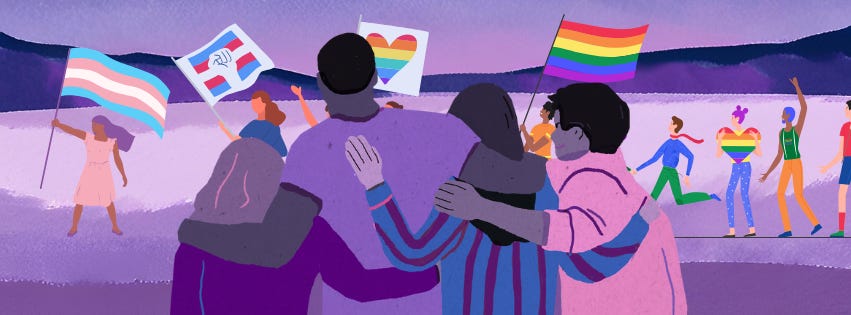Building Bi+ Community That Lasts After Pride
Bailey reflects on bi+ community building during Pride.
It’s Pride. The month where rainbows fill streets, timelines, and storefronts. The month when visibility feels possible. When we gather, celebrate, put on hot pants, slap on some glitter eyeshadow, and desperately try to feel like we belong somewhere.
And still, I hear it:
“I wish there were more bi+ community.”
“I wish I had what you have.”
“I wish I had a place to go.”
I hear these things with tenderness. I know that ache. I live it, too. But here’s what I need you to know: Wishing isn’t enough.
In my scant two years as a community organizer, I’ve learned that community doesn’t appear because we long for it. In the real world, it is not summoned by hashtags or longing or vibes. It’s built—quietly, imperfectly, steadily—by people who choose to show up even when they’re tired, even when they’re underfunded, even when no one says thank you.
Pride season is hard for a lot of us. For bi+ people, it can feel like both a spotlight and an erasure. We go to events and hope someone there sees us, gets us, invites us in. Sometimes that happens. A lot of times it doesn’t. Online, it’s even worse because, for some reason, biphobes feel especially emboldened during the time of year that is supposed to be one of solidarity. It sucks!
And if you’re the one organizing? Trying to host something for the community you love? That’s a different kind of grief.
Do you know what it takes to get a table at Pride? Time. Money. Labor. Mental energy. Emotional energy. People management skills that make you feel like an oral surgeon (because I’m pulling teeth to get people to volunteer, that’s the joke, which is also on me). Deep breaths when you realize no one else read the load-in instructions and you’re dragging a folding table down a city sidewalk by yourself.
Then, people RSVP to participate and cancel. Or they ghost, which is worse. And so you think you’re doing a horrible job because you can’t get people to participate, but then you’ll hear through someone else, “Just so you know, people are really talking about how hard you work.” But no one says that directly to you.
I want to be honest in the only way I know how: that kind of silence makes people stop trying. Not because we’re fragile. Because we’re human. And all of this—the events, the podcast, the stickers, the booths, the resources—is held together by human effort.
So if you want bi+ community, I invite you to ask yourself: What can I give?
Not in a way that drains you. Not in a way that ignores your limits. But in a way that honors the fact that you are part of this. That you matter. That your actions ripple outward.
Maybe you show up on time.
Maybe you tell someone, “Thank you for making this happen.”
Maybe you text a friend and say, “Let’s go to this together.”
Maybe you ask an organizer, “Do you need anything?”
Whatever it is, let it be something. Because inaction is not neutral. It chips away at the fragile scaffolding people are already holding with sore hands and burning hearts.
We all want to belong. But someone has to build the space we want to belong to. And if you rely on others to do that work, then honor them. Show up for them. Tell them they’re doing something good. That they’re not invisible. That you see them.
And if you are one of those people holding it all together, thank you. I see you. I’m one of you. I know how hard it is to keep going without being told you’re doing something worthwhile. So this is me telling you: You are. Please keep going. But also, you shouldn’t have to do it alone.
This Pride, let’s move from wishing to building. Let’s stop waiting. Let’s start showing up for real.
A very tired Killjoy,
Bailey




Very good article, and I honestly felt it a lot. I immediately sent it to some friends of a local Bi+ activism group I'm part of. The people leading the group are a *very* small group, I'm talking about two or three folks max. We've been discussing how to divide the responsibilities more and having more people cooperate, and I know they've been feeling tired and overworked. What you wrote brought me comfort and insight. Thank you for all the hard work you do